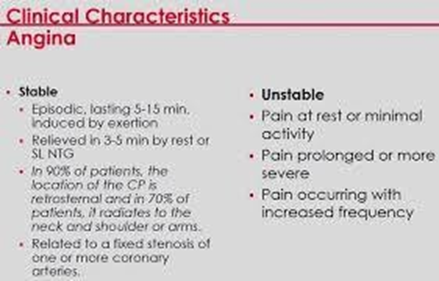A client asks the nurse to explain the difference between stable and unstable angina.
What is the best response by the nurse?
"Stable angina is predictable in its frequency, intensity, and duration. Unstable angina is when angina episodes become more frequent or severe, and occur during periods of rest.”
"Unstable angina is predictable in its frequency, intensity, and duration. Stable angina is when angina episodes become more frequent or severe, and occur during periods of rest.”
"Stable angina is caused by spasms of the coronary arteries. Unstable angina is when angina episodes become more frequent or severe, and occur during periods of rest.”
"Unstable angina is caused by spasms of the coronary arteries. Stable angina is when angina episodes become more frequent or severe, and occur during period of rest."
The Correct Answer is A
A. Stable angina is predictable and typically occurs with exertion or emotional stress and is relieved with rest or nitroglycerin. Unstable angina is less predictable and more serious, occurring at rest, with minimal exertion, or worsening pattern from stable angina.

B. This answer misrepresents the characteristics and causes of stable and unstable angina, mixing definitions or incorrectly assigning causes.
C. This answer misrepresents the characteristics and causes of stable and unstable angina, mixing definitions or incorrectly assigning causes.
D. This answer misrepresents the characteristics and causes of stable and unstable angina, mixing definitions or incorrectly assigning causes.
Nursing Test Bank
Naxlex Comprehensive Predictor Exams
Related Questions
Correct Answer is D
Explanation
Explanation:
A. Adequate hydration is important to prevent lithium toxicity; decreasing fluid intake is not recommended.
B. Constipation can slow the excretion of lithium and may increase the risk of toxicity, but it is not the most appropriate preventive measure.
C. Sudden changes in sodium intake can affect lithium levels, so restricting sodium-rich foods without medical advice is not advisable.
D. Clients should be cautious with physical activity in hot weather, as excessive sweating can lead to dehydration, increasing the risk of lithium toxicity.
Correct Answer is A
Explanation
Explanation:
A. This is because lithium levels can be affected by changes in sodium balance and hydration levels in the body. Excessive sweating can lead to dehydration, which can increase lithium levels and potentially lead to toxicity. Therefore, it is important for clients to be aware of the need to maintain hydration and to communicate with their healthcare provider if there are any significant changes in their fluid balance, such as those caused by excessive sweating.
B. Stopping lithium abruptly, especially when moods are stable, can lead to relapse of bipolar disorder symptoms and is not recommended.
C. Regular monitoring of blood levels of lithium is essential to ensure therapeutic levels and prevent toxicity; therefore, the statement indicating the client no longer needs blood checks is incorrect.
D. Restricting salt intake lowers the sodium levels which can decrease lithium elimination, hence increasing the risk of toxicity.
Whether you are a student looking to ace your exams or a practicing nurse seeking to enhance your expertise , our nursing education contents will empower you with the confidence and competence to make a difference in the lives of patients and become a respected leader in the healthcare field.
Visit Naxlex, invest in your future and unlock endless possibilities with our unparalleled nursing education contents today
Report Wrong Answer on the Current Question
Do you disagree with the answer? If yes, what is your expected answer? Explain.
Kindly be descriptive with the issue you are facing.
